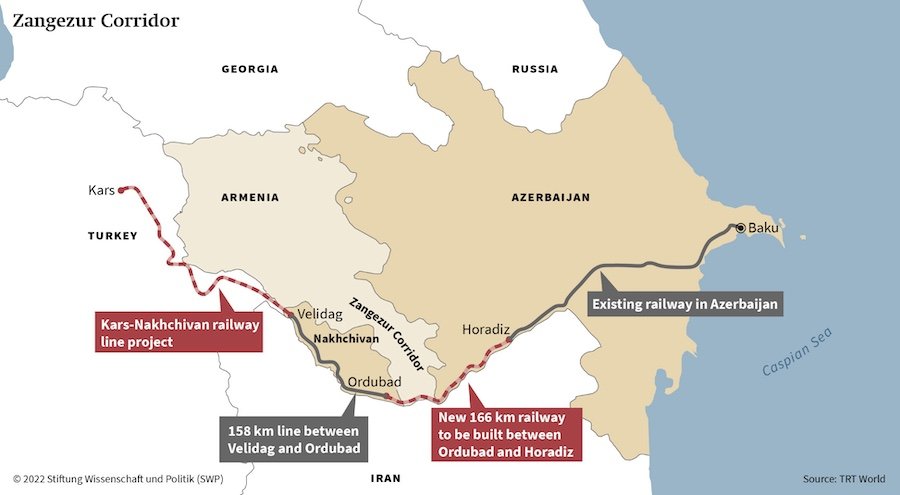By Kamran Hasanov
JULY 17 — BAKU/YEREVAN/ANKARA — A new round of debate has erupted over the Zangezur Corridor, this time not because of statements from Azerbaijani President Ilham Aliyev or Armenian Prime Minister Nikol Pashinyan, but due to a surprising comment from an American diplomat. U.S. Ambassador to Turkey Tom Barrack recently proposed that the United States lease the 32-kilometer stretch of Armenian territory connecting Azerbaijan to its Nakhchivan exclave.
“They’ve [Armenia and Azerbaijan] been arguing over 32 kilometers of road for a decade. It’s no joke. And now America comes in and says: ‘Fine, give us the 32 kilometers, we’ll lease it for 100 years, and everyone can use it,’” Barrack said during a July 11 briefing.
While official Yerevan quickly distanced itself from any suggestion of ceding sovereignty—whether to Russia’s FSB, as outlined in the trilateral statement of November 9/10, 2020, or to the United States—some officials have left room for ambiguity. Deputy Foreign Minister Mnatsakan Safaryan recently stated that Armenia is open to outsourcing road operations, provided it serves national interests.
Who Is Tom Barrack?
The man behind the idea is no ordinary ambassador. Tom Barrack, a long-time business associate of President Donald Trump, is known more for his real estate empire than diplomatic pedigree. In 2023, Fortune named him one of the world’s largest private real estate investors. His first major deal with Trump dates back to 1985, and he played a key advisory role during Trump’s presidential campaign.
Given his ties to Trump and his eye for strategic assets, observers suggest Barrack may be floating a commercial-diplomatic hybrid proposal—one he likely hopes to sell to the White House.
U.S. Strategy in the South Caucasus: Mixed Signals
Under President Joe Biden, the U.S. lost ground in the South Caucasus. Washington’s clash with Georgia over its foreign agent law, and Azerbaijan’s rejection of U.S. mediation in post-war peace talks, have left Armenia as its sole stable partner—hardly a strategic win.
Still, the Zangezur Corridor is of high geopolitical value. Even limited U.S. involvement could strengthen Washington’s hand in a region contested by Russia, Iran, and Turkey. Trump, known for transactional diplomacy, may see potential in managing a strategically located route that links Europe and Central Asia.
While Trump remains preoccupied with Ukraine, Middle East tensions, and U.S.-EU trade disputes, he has signaled renewed interest in the Caucasus. During a July 14 meeting with NATO Secretary General Mark Rutte, he remarked that peace between Armenia and Azerbaijan is “within reach.”
It remains unclear whether Trump is aware of Barrack’s proposal. At a recent press conference with Bahrain’s crown prince, Trump deferred a question on Syria’s Druze minority to Secretary of State Marco Rubio—raising doubts about his personal bandwidth on global affairs.
Why U.S. Control of the Corridor Is Unrealistic
Despite the media stir, U.S. involvement in the Zangezur Corridor remains unlikely for several reasons:
Armenia has ruled out surrendering sovereignty over the Syunik region. Prime Minister Pashinyan and the Armenian Foreign Ministry have been unequivocal: “No part of the Republic of Armenia can fall outside the country’s jurisdiction or territorial integrity.”
Turkey has not been approached. The administration of President Recep Tayyip Erdoğan told RIA Novosti it is unaware of any U.S. proposal regarding management of the corridor.
Azerbaijan has not indicated interest in American oversight. Baku’s demands remain focused on unrestricted transit to Nakhchivan, not on who administers the route.
Russia is still the de facto guarantor. As per the 2020 trilateral ceasefire agreement, the FSB would oversee operations if the corridor is implemented. Deputy Russian Foreign Minister Mikhail Galuzin recently reaffirmed that stance.
What the Barrack Comment Really Means
Though the proposal lacks traction on the ground, Barrack’s statement may signal renewed U.S. interest in the region—particularly under a second Trump administration. Washington is increasingly aware of the geopolitical vacuum left by Russia’s fraying influence and the rising role of Turkey and China in the South Caucasus.
In the end, Barrack’s proposal is more symbolic than actionable. It underscores America’s willingness to reengage in regional infrastructure diplomacy—but also exposes the limits of U.S. leverage in a space tightly interwoven with Russian, Turkish, and Iranian interests.
Unless Yerevan, Baku, and Ankara radically shift their positions, the Zangezur Corridor will likely remain under regional control, with the U.S. confined to the role of an interested observer—for now.


